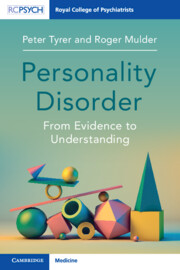Book contents
- Personality Disorder
- Personality Disorder
- Copyright page
- Dedication
- Contents
- Foreword
- Acknowledgements
- Chapter 1 History of Personality and Its Disorders
- Chapter 2 Assessment of Personality
- Chapter 3 Personality Difficulty
- Chapter 4 Borderline Personality Disorder
- Chapter 5 Cultural Perspectives
- Chapter 6 Personality and Health
- Chapter 7 Personality Disorders and Comorbidity with Other Mental Illness
- Chapter 8 Treatment and Outcome of Personality Disorder
- Chapter 9 Moderating the Stigma of Personality Disorder
- Chapter 10 What Needs to Be Done Now
- Appendices
- References
- Index
Chapter 3 - Personality Difficulty
Published online by Cambridge University Press: 04 February 2022
- Personality Disorder
- Personality Disorder
- Copyright page
- Dedication
- Contents
- Foreword
- Acknowledgements
- Chapter 1 History of Personality and Its Disorders
- Chapter 2 Assessment of Personality
- Chapter 3 Personality Difficulty
- Chapter 4 Borderline Personality Disorder
- Chapter 5 Cultural Perspectives
- Chapter 6 Personality and Health
- Chapter 7 Personality Disorders and Comorbidity with Other Mental Illness
- Chapter 8 Treatment and Outcome of Personality Disorder
- Chapter 9 Moderating the Stigma of Personality Disorder
- Chapter 10 What Needs to Be Done Now
- Appendices
- References
- Index
Summary
The term ‘personality difficulty’ will be unfamiliar to most people except as a general concept, but it will be part of the ICD-11 diagnostic spectrum of personality disorder in January 2022. We know a fair deal about it, but it is not a diagnosis. It is listed in the section of the ICD-11 classification for ‘non-disease entities that constitute factors, influencing health status and encounters with health services, that may be of clinical importance’, called Q Factors. The important section for personality difficulty is QE50 (problems associated with relationships). The full QE50 list is shown in Table 3.1.
- Type
- Chapter
- Information
- Personality DisorderFrom Evidence to Understanding, pp. 26 - 30Publisher: Cambridge University PressPrint publication year: 2022



